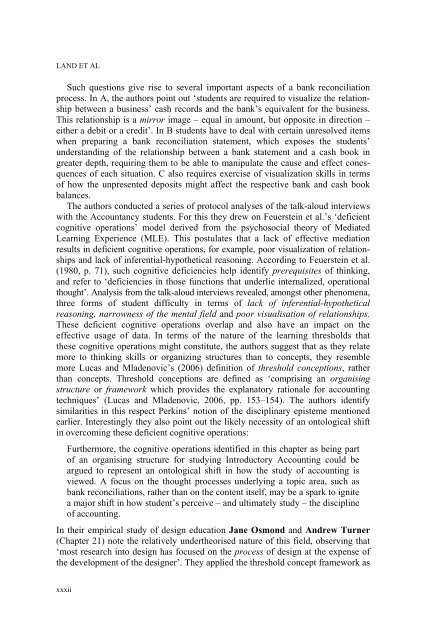1177-threshold-concepts-and-transformational-learning
1177-threshold-concepts-and-transformational-learning
1177-threshold-concepts-and-transformational-learning
- No tags were found...
You also want an ePaper? Increase the reach of your titles
YUMPU automatically turns print PDFs into web optimized ePapers that Google loves.
LAND ET ALSuch questions give rise to several important aspects of a bank reconciliationprocess. In A, the authors point out ‘students are required to visualize the relationshipbetween a business’ cash records <strong>and</strong> the bank’s equivalent for the business.This relationship is a mirror image – equal in amount, but opposite in direction –either a debit or a credit’. In B students have to deal with certain unresolved itemswhen preparing a bank reconciliation statement, which exposes the students’underst<strong>and</strong>ing of the relationship between a bank statement <strong>and</strong> a cash book ingreater depth, requiring them to be able to manipulate the cause <strong>and</strong> effect conesquencesof each situation. C also requires exercise of visualization skills in termsof how the unpresented deposits might affect the respective bank <strong>and</strong> cash bookbalances.The authors conducted a series of protocol analyses of the talk-aloud interviewswith the Accountancy students. For this they drew on Feuerstein et al.’s ‘deficientcognitive operations’ model derived from the psychosocial theory of MediatedLearning Experience (MLE). This postulates that a lack of effective mediationresults in deficient cognitive operations, for example, poor visualization of relationships<strong>and</strong> lack of inferential-hypothetical reasoning. According to Feuerstein et al.(1980, p. 71), such cognitive deficiencies help identify prerequisites of thinking,<strong>and</strong> refer to ‘deficiencies in those functions that underlie internalized, operationalthought’. Analysis from the talk-aloud interviews revealed, amongst other phenomena,three forms of student difficulty in terms of lack of inferential-hypotheticalreasoning, narrowness of the mental field <strong>and</strong> poor visualisation of relationships.These deficient cognitive operations overlap <strong>and</strong> also have an impact on theeffective usage of data. In terms of the nature of the <strong>learning</strong> <strong>threshold</strong>s thatthese cognitive operations might constitute, the authors suggest that as they relatemore to thinking skills or organizing structures than to <strong>concepts</strong>, they resemblemore Lucas <strong>and</strong> Mladenovic’s (2006) definition of <strong>threshold</strong> conceptions, ratherthan <strong>concepts</strong>. Threshold conceptions are defined as ‘comprising an organisingstructure or framework which provides the explanatory rationale for accountingtechniques’ (Lucas <strong>and</strong> Mladenovic, 2006, pp. 153–154). The authors identifysimilarities in this respect Perkins’ notion of the disciplinary episteme mentionedearlier. Interestingly they also point out the likely necessity of an ontological shiftin overcoming these deficient cognitive operations:Furthermore, the cognitive operations identified in this chapter as being partof an organising structure for studying Introductory Accounting could beargued to represent an ontological shift in how the study of accounting isviewed. A focus on the thought processes underlying a topic area, such asbank reconciliations, rather than on the content itself, may be a spark to ignitea major shift in how student’s perceive – <strong>and</strong> ultimately study – the disciplineof accounting.In their empirical study of design education Jane Osmond <strong>and</strong> Andrew Turner(Chapter 21) note the relatively undertheorised nature of this field, observing that‘most research into design has focused on the process of design at the expense ofthe development of the designer’. They applied the <strong>threshold</strong> concept framework asxxxii




